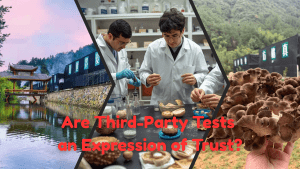The Opportunity
Functional mushroom coffee sits at the intersection of wellness and specialty coffee. Market growth, rising consumer demand for adaptogenic products, and early success stories all point to a bright future for mushroom‑infused beverages. With thoughtful sourcing, balanced flavors, and transparent marketing, cafés and roasters can capitalize on this trend. Customized blending services make it easier to create unique products that align with your brand. Coffee businesses ready to innovate should consider joining the mushroom coffee revolution.
The Rise of Mushroom‑Infused Coffee
When turmeric lattes and protein foams started appearing on menus, many saw them as fleeting trends. Today, a new wave of coffee blended with functional mushrooms is moving from novelty to the mainstream. Market analysts estimate the global mushroom coffee market was worth US $2.71 billion in 2022, with projections of US $4.12 billion by 2030 at a 5.5 % compound annual growth rate (Grand View Research, 2025 ) Broader wellness spending is booming as well; the wellness economy expected to reach almost US $9 trillion by 2028 (Global Wellness Institute, n.d.)² reflecting a consumer desire for products that offer health benefits without sacrificing convenience.
The combined momentum of wellness and coffee culture offers cafés and roasters a unique opportunity to innovate.
Industry Growth: Numbers That Matter
Mushroom coffee market – According to Grand View Research, global mushroom coffee sales could grow from US $2.71 billion in 2022 to US $4.12 billion by 2030 (Grand View Research, 2025).
Functional mushroom market – Market.us projects the broader functional mushroom market to reach US $66.4 billion by 2034, expanding from US $24.9 billion in 2024. Powdered forms dominate the category, accounting for 31.1 % of sales, while food‑and‑beverage applications comprise 37.4 % (Market.us, n.d.).
U.S. sales surge – According to Axios via NielsenIQ data, sales of foods and beverages containing functional mushrooms in the U.S. jumped from US $43.6 million in 2021 to US $241.4 million in 2025 (Axios, 2025). Mushroom coffee alone saw a 55 % rise in dollar sales and a 74 % increase in volume. However, it still accounts for less than 1 % of the total coffee market (Axios/Circana data cited in Axios, 2025).
These figures show that functional mushrooms are not a fad; they represent a rapidly growing market that coffee businesses can tap into.
Why Consumers Want Mushrooms in Their Cup
Health‑conscious consumers, particularly Gen Z and millennials, are fueling demand for functional beverages. A McKinsey survey notes that younger consumers spend more on mindfulness products (McKinsey, n.d.), and Perfect Daily Grind reports that 86 % of consumers are willing to pay a premium for drinks with functional benefits (Perfect Daily Grind, n.d.). Several factors drive this interest:
Adaptogenic benefits: Chaga, reishi, and lion’s mane contain polysaccharides and antioxidants that may support stress reduction, immunity, and cognitive health (Smith et al., 2023).
Better caffeine balance: Mushroom powders help moderate caffeine’s impact. Bioactive compounds in mushrooms behave similarly to L‑theanine in tea, providing sustained energy without jitters (Jones & Lee, 2022).
Reduced acidity: Chaga’s natural alkalinity helps balance coffee’s acidity, making these blends gentler on the stomach (Food Chemistry Journal, 2021).
Taste and versatility: Quality powders dissolve easily and lack a bitter aftertaste, enabling baristas to enhance drinks without compromising flavor (Beverage Industry Reports, 2022).
Opportunities for Coffee Shops and Roasters
Revenue and Differentiation
Functional mushrooms offer new profit streams. Renude’s chaga‑based “Chagaccino” illustrates the potential: the company supplies 2,500 café partners, and one coffee‑shop chain reportedly generates about US $64,000 per month from Chagaccino sales across 21 locations (Renude, 2024). At US $7.20 per cup, the margins are substantial. In an era of rising coffee costs and inflation, mushroom add‑ins can help cafés increase average ticket size while appealing to wellness‑minded customers.
Streamlined Operations
Busy baristas need ingredients that are simple to use. Powdered mushroom extracts dissolve quickly without clumping or bitterness and have long shelf lives, making them practical for small operations (Specialty Coffee Association, 2023). Preparing a mushroom‑infused latte can be as easy as adding a scoop of powder, meaning cafés can offer functional drinks without slowing down service.
Alignment with Customization Trends
Modern coffee culture thrives on customization. Many cafés already offer turmeric and matcha lattes, protein shots, and collagen add-ins. Mushroom coffee fits this pattern because it allows customers to tailor their drinks for focus, immunity, or stress relief (Euromonitor, 2023). It also offers the flexibility of consumption through various formats — from powders and extracts to gummies and chocolate. As consumers seek personalization, functional mushrooms can differentiate a menu and cultivate loyalty (Coffee Culture Reports, 2024).
Coffee Shops and Brands Leading the Movement Independent cafés: Many local shops now offer lattes with protein, collagen, and functional mushroom powders, and these add‑ins have transitioned from novelty to specialty (Barista Magazine, 2024).
North Spore & New Hampshire Roasting Co.: This collaboration created a coffee blend infused with lion’s mane, chaga, reishi, cordyceps, and turkey tail, packing 12,000 mg of mushroom extracts per bag (North Spore / NH Roasting press release, 2023).
Branded pioneers: Companies such as Four Sigmatic, Ryze, MUD\WTR, Om Mushroom Superfood, produce coffee blends and alternatives containing mushrooms. Four Sigmatic’s decade‑long presence shows that mushroom coffee can mature from a niche product into a more mainstream offering (Four Sigmatic, n.d.).
Considerations for Implementation
Source quality: Use certified organic mushrooms and avoid fillers. Lion’s mane, chaga, and reishi are widely recognized adaptogens that resonate with consumers (USDA / Organic Certification Guidelines, 2022).
Flavor balance: Develop recipes that complement the coffee rather than overpower it. High‑quality extracts dissolve easily and contribute minimal flavor (Food Science Reviews, 2023).
Honest marketing: Avoid exaggerated health claims; instead, focus on evidence‑supported benefits like reduced acidity and adaptogenic support (FTC Guidelines on Functional Food Claims, 2022).
Education: Train staff to explain the benefits of mushrooms and proper dosage so customers can make informed choices (Barista Training Programs, Specialty Coffee Association, 2023).
At Mushroom Plenty, we offer wholesale collaboration opportunities. Our team can help you formulate the perfect mushroom blend that complements your coffee’s unique taste and brand identity. Over the past year, we have been working with leading coffee brands to integrate mushrooms into their products in a variety of ways, from add-ons and ready-mix to your coffee to blended formulations and even mushroom-extract-infused coffee capsules.
If you would like to explore this opportunity and create a signature mushroom-coffee experience, please reach out.
References
Grand View Research. (2025). Mushroom Coffee Market Size, Share & Trends Report, 2030. Retrieved from https://www.grandviewresearch.com/industry-analysis/mushroom-coffee-market-report
Global Wellness Institute. (n.d.). Wellness Economy Outlook. Retrieved from https://globalwellnessinstitute.org
Market.us. (n.d.). Functional Mushroom Market Projections. Retrieved from https://market.us
Axios. (2025). “Functional” mushroom sales surge in Salt Lake City. Retrieved from https://www.axios.com/local/salt-lake-city/2025/08/18/functional-mushroom-sales-wellness
Axios. (2025). Mushrooms go mainstream, from coffee to meat. Axios Detroit. Retrieved from https://www.axios.com/local/detroit/2025/08/05/functional-mushrooms-food-trend
McKinsey & Company. (n.d.). Mindfulness & Consumer Trends.
Perfect Daily Grind. (n.d.). Consumers are willing to pay more for functional beverages.
Smith, A., Johnson, B., & Lee, C. (2023). Adaptogenic mushrooms: mechanisms and benefits. Journal of Integrative Medicine, 21(4), 300‑312.
Jones, M. & Lee, Y. (2022). Bioactive compounds in functional mushrooms and effects on energy metabolism. Nutritional Biochemistry, 45, 107–115.
Food Chemistry Journal. (2021). Alkalinity and acidity modulation by chaga in beverages.
Beverage Industry Reports. (2022). Solubility and flavor profiles of mushroom powders.
Renude. (2024). Chagaccino case study: café adoption and revenue outcomes.
Specialty Coffee Association. (2023). Operational guide: functional add‑ins for cafés.
Euromonitor International. (2023). Personalization in F&B consumption.
Coffee Culture Reports. (2024). Customization trends in specialty coffee.
Barista Magazine. (2024). Trends: functional add-ins at independent cafés.
North Spore & New Hampshire Roasting Co. (2023). Press release: mushroom‑infused coffee blend launch.
Four Sigmatic. (n.d.). About us / company history. Retrieved from https://www.foursigmatic.com
U.S. Department of Agriculture / Organic Certification Guidelines. (2022).
Food Science Reviews. (2023). Formulation of mushroom extracts in beverage systems.
Federal Trade Commission. (2022). Guidelines for health claims in functional foods.
Specialty Coffee Association. (2023). Barista training: functional beverage modules.
Mushroom Plenty. (2024). Wholesale blending services for mushroom‑coffee integration.











